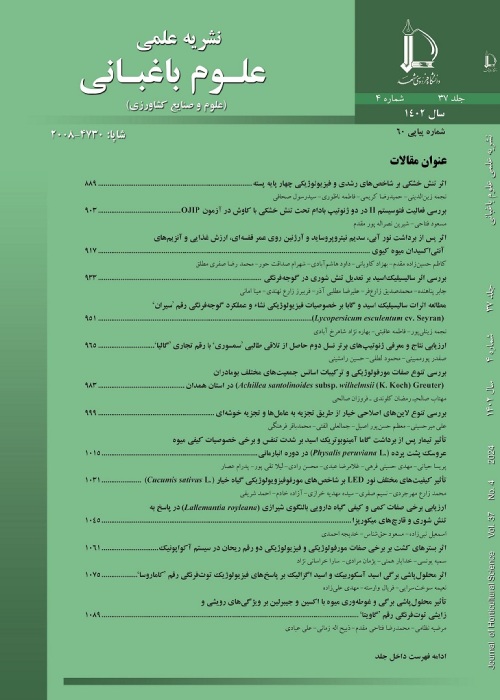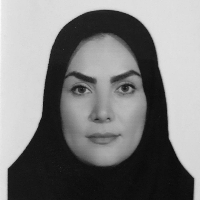Culture Efficiency on Virus Elimination from in vitro Shootlets of Red Flesh Apple (Malus pumila Mill.)
Apple (Malus spp.) is one of the most economically important fruit crop worldwide. This crop is highly affected by various virus infections, leading its considerable devastation and eventually results in yield loss in the whole world. Among effective viruses, Apple stem grooving virus (ASGV), Apple stem pitting virus (ASPV), and Apple chlorotic leaf spot virus (ACLSV) which have been firstly characterized in apple (Malus domestica), play important roles in altering the plant defense mechanism, leading a low performance. According to the references, heat treatments can reduce the movement of virus particles into the apical meristem through inhibiting viral RNA synthesis, so high temperature over a long period is an efficient method for virus elimination. In additions, meristem culture is also a common method to eradicate viruses from horticultural plants. This study was done to produce virus-free (ACLSV, ASPV, ASGV) apple (Malus pumila Mill.) plantlets.
The effect of different thermotherapy duration (0, 7, 14 and 21 days at 38 °C) and the sizes of apical meristems for meristem culture(less than 0.2 mm, between 0.2 and 0.7 mm and larger than 0.7 mm) was assessed on virus eradication. Our plant material was a genotype of red flesh apple belongs to Budagovsky Bud.9 (Malus+pumila) "Niedzwetzkyana" of Rosaceae family from Shahroud, that has high levels of important phytochemicals like antioxidants, flavonoids and anthocyanins in its cortex, which in addition to attractiveness, creating special healing properties in some disease. At first the presence of ACLSV, ASGV and ASPV were checked in mother samples by ELISA and RT-PCR methods. Then we performed the thermotherapy treatments and later meristems were cultivated and grown in vitro. Regenerated shoots from meristem were tested by ELISA and RT-PCR methods for all three viruses. Samples that were diagnosed virus-free by both techniques, were proliferated, rooted and transferred into the pots to be used for later propagation and establishment of the mother orchard. Results and Discussion ELISA results for the presence or absence of ACLSV, ASGV and ASPV were indeterminate; they were neither negative nor positive for each virus, indicating ELISA was not an accurate method to study virus infections in our samples. Therefore, careful examination of initial infection of samples was performed by RT-PCR. Examining mother samples by RT-PCR showed that all samples were infected by ASG, ASP and ACLS viruses. Results of RT-PCR testing suggested that the number of days in thermotherapy and the size of meristem had a significant effect (P<0.01) on the ACLSV, ASGV and ASPV elimination. Increasing in the duration of the thermotherapy decreased the survival rate of the explants and it was difficult to acquire virus-free explants after 21 days treatments, because all the explants were destroyed in this treatment. The relation between the size of meristem and its survival has been examined in different studies, whose results are consistent with the present research and confirms that increasing the size of the meristem and the number of leaf primordium, will increase the vitality. However, it should be noted that larger meristems are more susceptible to viral contamination. In the previous study, the percentage of ASGV and ACLSV elimination was significantly influenced by the size of the meristem and the duration of the thermotherapy. In the same study, ACLSV, ASGV and ASPV could not be detected in plants grown from meristems smaller than 1 mm after 35 days of thermotherapy. They also showed that virus eradication was happened after shorter period of thermotherapy if smaller meristems were cultured (0.7 mm). The results of our study were consistent with these observations; ACLSV, ASGV and ASPV appeared to be eliminated more frequently from the smallest meristem treatment (smaller than 0.2 mm) compared to the other treatments (0.2-0.7 mm and larger than 0.7 mm). Elimination rates of ACLSV, ASGV and ASPV were different in each case and ASPV-free frequency obtained in regenerated shoots treatment was higher than other viruses (ASGV and ACLSV). This observation was similar to the results of some previous studies. It could be due to differences in the morphology of the viruses and transmission factors in plant cells that affect viruses, which has been investigated and confirmed in previous studies. Meristem culture alone, without other treatments, had very low efficiency in virus elimination from explants. The best results of virus eradication from apple explants was obtained after 14 days of thermotherapy, that we had 44.44%, 11.11% and 88.89% of virus-free samples from ACLSV, ASGV and ASPV, respectively. Generally, our results showed that by increasing the thermotherapy duration, the elimination of all three types of viruses was increased. Many researchers also found that thermotherapy is a very effective treatment in virus eradication.
Results showed that increasing the duration of thermotherapy (14 days) and reducing the size of cultivated meristem (smaller than 0.2mm) increased the elimination rate of all three viruses (ACLSV، ASPV، ASGV) from apple explants.
- حق عضویت دریافتی صرف حمایت از نشریات عضو و نگهداری، تکمیل و توسعه مگیران میشود.
- پرداخت حق اشتراک و دانلود مقالات اجازه بازنشر آن در سایر رسانههای چاپی و دیجیتال را به کاربر نمیدهد.



